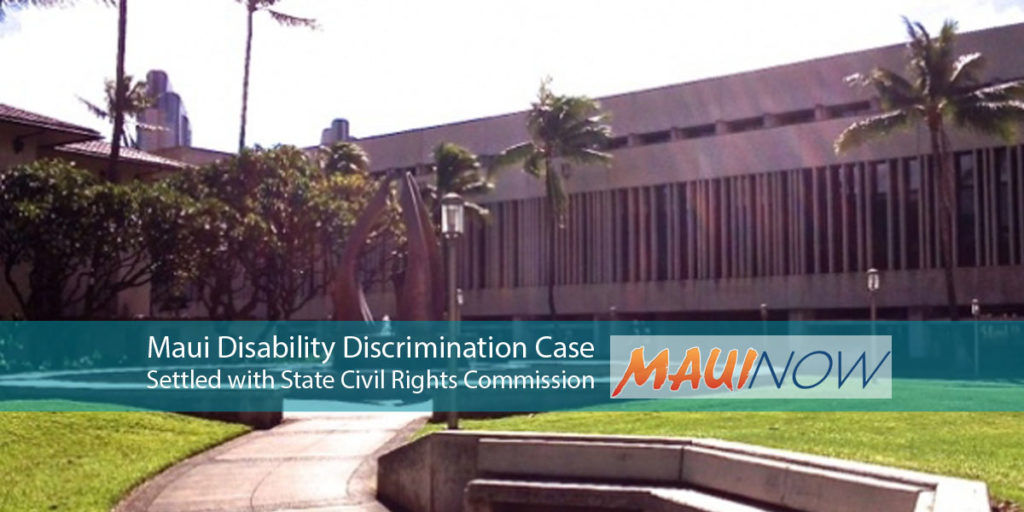Maui Disability Discrimination Case Settled
A settlement has been reached between the Hawaiʻi Civil Rights Commission and the County of Maui over a complaint filed that alleged denial of reasonable accommodations for a disabled employee.

Background image courtesy HCRC.
The no-fault settlement provides for review of the County of Maui’s non-discrimination policy by the HCRC, with revisions as deemed necessary. It also calls for non-discrimination training for County of Maui employees, with a specific focus on disability discrimination, and monetary relief to the complainant.
HCRC Executive Director William Hoshijo stated, “The County of Maui should be commended for agreeing to review its current policies and training to prevent and eliminate discrimination and promote equal opportunity for all in county employment, regardless of disability.”
County of Maui Equal Employment Opportunity Specialist Ralph Thomas agreed saying, “It has always been the County of Maui’s policy to provide reasonable accommodations training to employees and managers so they have the information needed to address any physical or mental disabilities they may encounter while employed with the County of Maui. This settlement reaffirms that commitment.”
The case involved a long-time employee of the County of Maui who claimed that she was denied a reasonable accommodation in the workplace.
The employee’s doctor requested the elimination or reassignment of a job function and the requested accommodation was initially granted to the employee. However, the employee’s request for an accommodation was eventually denied.
The case was settled during conciliation after an HCRC finding of reasonable cause, but before a final decision was issued by the Commission and with no admission by the County of Maui of any wrongdoing.
Under Hawaiʻi law, an employee with a disability may request a reasonable accommodation, which is an adjustment or change needed to allow the employee to perform the essential functions of the job. Managers and supervisors should be trained to distinguish between the essential and marginal functions of the job when considering a request for a reasonable accommodation.
If a request for accommodation has been made, the employer must initiate an interactive process with the employee to determine what, if any, accommodation can be provided. Communication between the employer and employee during the interactive process is essential. The parties should identify the precise limitations resulting from the disability that impact job performance, whether an adjustment or change is needed to allow the employee with a disability to perform the essential job functions, and if any alternative accommodations may be effective in meeting the employee’s needs.
State officials explained that reasonable accommodation in the workplace is not preferential treatment, rather, it allows an individual with a disability to perform the essential functions of the position. The employee with a disability is not entitled to his/her preferred accommodation if the employer has identified an alternative reasonable accommodation that also effectively allows the employee to perform the essential functions of the job.
Further, an employer may deny a proposed accommodation by showing that it would impose an undue hardship on the operation of its business. The goal of the interactive process is to identify a reasonable accommodation for both sides.
“What should an employer do when an employee with a disability requests a reasonable accommodation?” Hoshijo says, “both the employer and the employee have an obligation to engage in an interactive process, or simply a discussion to see if there is a reasonable accommodation. Both state law and the federal Americans with Disabilities Act require this, and it may seem complex, but at its core it is based on common sense and good faith.”
The Hawaiʻi Civil Rights Commission is responsible for enforcing state civil rights laws that prohibit discrimination in employment, housing, public accommodations, and state-funded services.
The public is encouraged to contact the HCRC if they feel hey have been subjected to discrimination on any basis protected under state law, by calling (808) 586-8636, or emailing [email protected].










